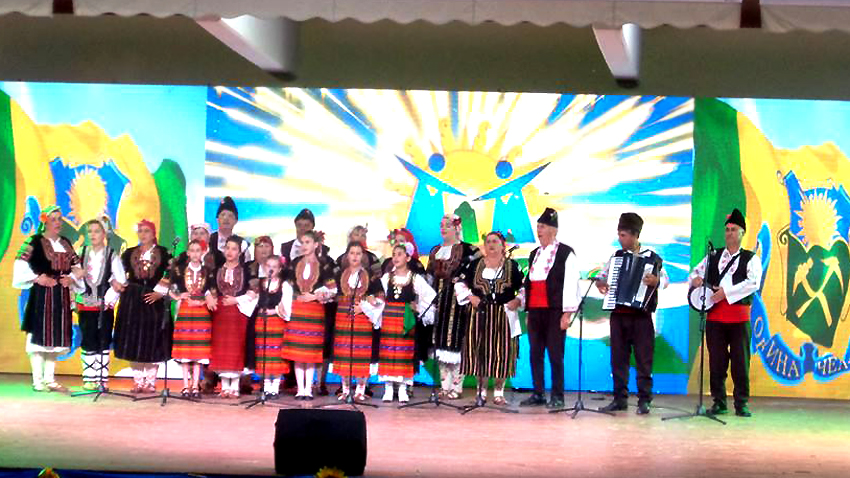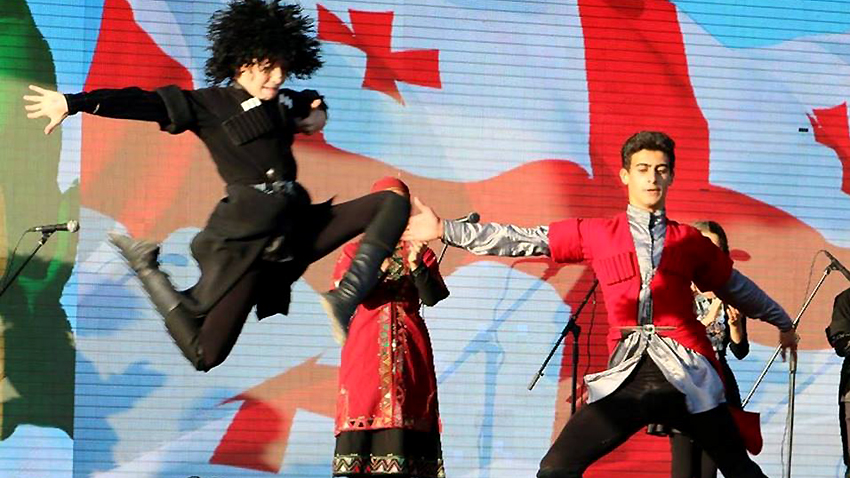“The prettiest, the bonniest village of them all, Chelopech,” goes the hymn of the Gold Dust International Folklore Festival; both music and lyrics are by Hristofor Radanov. That it is one of the most well-kept and pretty little village in this country is something we know. But what continues to surprise visitors from Bulgaria and abroad is the flair with which different events are organized there. One of the well-attended events is the Gold Dust Festival, held here 21 – 24 July. The third edition of the festival presented colourful dancers from Russia, Georgia, Argentina, Spain, Serbia. A contest for Bulgarian folklore groups and soloists was held for the second time with the participation of hundreds of amateur performers, mostly from the Shoppe region in Southwestern Bulgaria and the towns and villages in the vicinity of Chelopech.
 “The songs I sung are from the “Songs of Sredna Gora” collection by Loukan Savov. I have been living in Pleven for 45 years, but my heart is right here. The group I work with in Brushlyanitsa village performs authentic songs which I insisted we include in the repertoire.”
“The songs I sung are from the “Songs of Sredna Gora” collection by Loukan Savov. I have been living in Pleven for 45 years, but my heart is right here. The group I work with in Brushlyanitsa village performs authentic songs which I insisted we include in the repertoire.”
According to the competition rules there are two grand prix – for best dance group and for best singing group. Here is Radka Lazarova, librarian, secretary of the chitalishte and artistic leader of the winner – the Songs from Gorno Pole folklore ensemble at the Probouda 1923chitalishtein Ovchartsi village near Kyustendil:
“The village is near the resort of SaparevaBanya. The ensemble was founded in 1962. We have a dance group, male and female vocal groups. We work a lot with children and I am happy to say they have been very successful. Emanuela Stoykova was admitted to the Lyubomir Pipkov National Music School this year, several children from the group graduated the National School of Folklore Arts in Shiroka Luka, we have students at the music academy in Plovdiv. I am so grateful these talented children were born in Ovchartsi. We have tracked down around 200 songs from the village and the region. It is very difficult to find unrecorded authentic music, but we are not giving up.”
 The other grand prix went to the Sofia 6 Folklore Dance Ensemble at the Vitosha 1951 chitalishte in Sofia, with leader Nikolay Nestorov who is the son of the ensemble’s founder – Nestor Nestorov. The dance ensemble has several prestigious international awards to its name.
The other grand prix went to the Sofia 6 Folklore Dance Ensemble at the Vitosha 1951 chitalishte in Sofia, with leader Nikolay Nestorov who is the son of the ensemble’s founder – Nestor Nestorov. The dance ensemble has several prestigious international awards to its name.
Here now is Rosen Bogdanov, Secretary General of the International Union of Folklore Associations, IGF:
“Let me start by saying that I was impressed by the location of the event. Few festivals have seen a stage like that with all conveniences for audience and performers. The organization was impeccable and the enthusiasm of the people working for the festival – infectious. I would like to congratulate the mayor and his team.”
 The children from the Phoenix dance group from the town of Zugdidi, Georgia, with leader GurgenI KhorAva were delighted to take part. Because of the situation in Turkey and the risks of travelling, the group had to be reduced to the children’s formation only. Nonetheless, the children were brilliant. Laura Franchini, founder and head of Ballet Cultural Argentino says the festival was a truly high standard event. The dancers from her group are architects, physicists, students, lecturers but what has brought them together is their love of art. Alongside traditional Argentinian dancing, at the organizers’ insistence they also danced the tango.
The children from the Phoenix dance group from the town of Zugdidi, Georgia, with leader GurgenI KhorAva were delighted to take part. Because of the situation in Turkey and the risks of travelling, the group had to be reduced to the children’s formation only. Nonetheless, the children were brilliant. Laura Franchini, founder and head of Ballet Cultural Argentino says the festival was a truly high standard event. The dancers from her group are architects, physicists, students, lecturers but what has brought them together is their love of art. Alongside traditional Argentinian dancing, at the organizers’ insistence they also danced the tango.
The audience enthusiastically applauded the Ural dance ensemble from Chelyabinsk, Russia, the representatives of the Yana Culture and Art Society from Zemun, Serbia, the Zlatno Rouno (Golden Fleece) mummers’ club and the Izvorcheta (Brooks) children’s dance group from Bulgaria…
 Here now is Iva Turneva, one of the leaders of the dance ensemble at the Sredets municipal culture club which won first place in the Folklore Dance category:
Here now is Iva Turneva, one of the leaders of the dance ensemble at the Sredets municipal culture club which won first place in the Folklore Dance category:
“Our dance group has a very long history and many awards to its name. This is the second year running that we have taken part in the festival in Chelopech. It is a wonderful place and the organizers have taken care of everything. We are combining our stay with teambuilding for the members in the old town of Koprivshtitsa. We’ll be back again next year.”
“When the economy starts to run aground, culture is the first to suffer,” says the mayor of Chelopech engineer Alexy Kesyakov. “Still, traditions must be kept alive no matter what. And that is exactly what our festival is doing. We shall continue to develop it and we are hoping it will assert itself as a hub of Bulgarian culture. We are delighted the festival’s popularity has been spreading and the audience comes back here again and again. This is the third year we have been accumulating experience and learning how to do our job better. It is a lesson for the administration and the municipality as a whole. The next festival will be all the more colourful and appealing for audiences, I am sure of it.”
Photos: Albena Bezovska
In the middle of August in Kyustendil, Southwestern Bulgaria, the "Panagia - Raising of the Bread" holiday takes place. The holiday is directly related to the church holiday "Assumption of the Blessed Virgin Mary", marked on August..
A three-day embroidery festival takes place in the square of the village of Vardim near Svishtov, the organizers reported. At its core, the festival promotes a particularly colorful part of our lifestyle and traditions -..
Fans of Bulgarian folklore are getting together in the village of Ribaritsa near Teteven on 20 and 21 July for the 3 rd national festival and the 16 th edition of the festival of folklore of national customs and authentic traditional costumes in a..
The Roma community in Bulgaria is celebrating Vasilyevden /or Vasilitsa, Bango Vasili (literally the Lame Vasil)/, also known as the Roma New Year ,..

+359 2 9336 661
